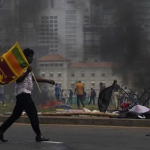Following an acute balance of payments crisis, Sri Lanka opted to default on its foreign debt in April 2022. This triggered the worst economic crisis in over 70 years of post-independence Sri Lankan history in a once enviable basic needs success case. Understanding what happened in Sri Lanka could help prevent or lessen the impact of future economic crises in South Asia and the rest of the developing world.
This South Asia Scan examines Sri Lanka’s sovereign debt default and economic crisis as a cautionary tale for the other developing countries in South Asia and beyond. It maps the effects of the crisis, discusses underlying causes and draws key policy lessons.
The findings reveal that the default led to a severe economic contraction, rising inflation and a significant rise in poverty. Mass public protests led to the resignation of a powerful government led by President Gotabaya Rajapaksa.
Although external economic shocks and a Chinese debt trap did play their part, the evidence suggests that the main cause of the crisis was economic mismanagement through multiple policy missteps and inward-looking, home-grown economic remedies.
The findings also highlight the remarkable stabilisation of the Sri Lankan economy in early 2024. This can be traced to the decisive policies by the new government under President Ranil Wickremesinghe, supported by a delayed International Monetary Fund (IMF) bailout and interim emergency Indian aid. However, political uncertainties lie ahead with presidential elections scheduled in late 2024 and parliamentary elections in 2025.
Policy lessons for other debt distressed developing countries include the benefits of early recourse to IMF financing, the insufficiency of foreign currency swaps and loans for external debt management, the need to strengthen safety nets at the onset of a crisis, having a strong independent central bank and effective crisis management capabilities.
Read the full paper here.
Ganeshan Wignaraja is Professorial Fellow for Economics and Trade, Gateway House.
This paper is part of South Asia Scan published by the Institute of South Asian Studies.
Support our work here.


